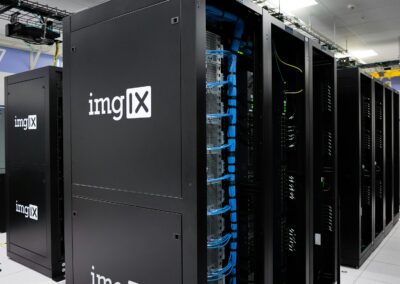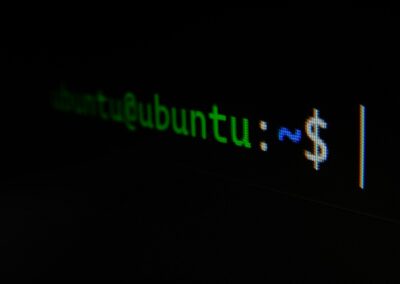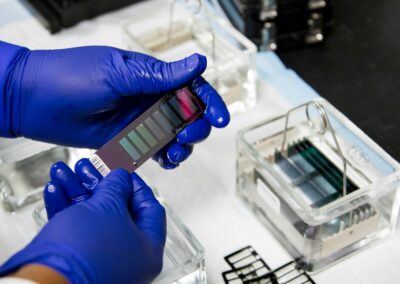Exploring the Potential of Molecular Computing in Saudi Arabia and the UAE
Understanding Molecular Computing
The fundamentals of molecular computing involve leveraging molecular structures and reactions to create new forms of data processing and storage. This cutting-edge technology represents a significant departure from traditional silicon-based computing, offering the potential for unprecedented computational power and efficiency. Molecular computing harnesses the unique properties of molecules to perform calculations and store information, leading to devices that are smaller, faster, and more energy-efficient than conventional computers.
In Saudi Arabia, where Vision 2030 aims to transform the economy through technological innovation, molecular computing can play a crucial role in driving progress. This technology could enable the development of powerful new computational tools for various sectors, including healthcare, finance, and environmental science. For instance, molecular computers could process complex biological data to advance personalized medicine or analyze vast financial datasets to uncover new investment opportunities.
Similarly, the UAE’s ambitious initiatives in digital transformation and smart city development stand to benefit significantly from molecular computing. The UAE’s commitment to becoming a global leader in technology and innovation aligns perfectly with the potential of molecular computing to revolutionize data processing and storage. By adopting this technology, the UAE can enhance its capabilities in areas such as AI, blockchain, and the metaverse, fostering economic growth and improving the quality of life for its residents.
Innovations in Data Processing with Molecular Computing
One of the most exciting aspects of molecular computing is its ability to revolutionize data processing. Traditional computers rely on binary code and transistors to perform calculations, but molecular computers use the quantum properties of molecules to achieve much higher levels of efficiency and speed. This capability is particularly valuable in fields that require extensive data analysis and real-time decision-making.
In Saudi Arabia, where industries are increasingly data-driven, molecular computing can provide a competitive edge. For example, in the oil and gas sector, molecular computers could analyze seismic data more quickly and accurately, leading to better exploration and extraction strategies. Similarly, in the healthcare sector, molecular computing could enable faster and more precise analysis of genetic data, paving the way for breakthroughs in personalized medicine and genomics.
The UAE, with its focus on smart cities and digital infrastructure, can also harness the power of molecular computing for advanced data processing. Smart city initiatives generate vast amounts of data from sensors, cameras, and other devices, requiring efficient processing to optimize urban management and services. Molecular computing can handle these large datasets more effectively than traditional systems, enabling real-time analysis and decision-making for traffic management, energy consumption, and public safety.
Advancing Data Storage with Molecular Computing
Molecular computing not only enhances data processing but also offers revolutionary advancements in data storage. Traditional storage technologies, such as hard drives and solid-state drives, are reaching their physical limits in terms of capacity and speed. Molecular storage, on the other hand, leverages the molecular scale to store vast amounts of data in incredibly small spaces, offering higher density and faster access times.
In Saudi Arabia, where data is becoming a critical asset for economic development, molecular storage can provide significant advantages. For instance, the financial sector generates and processes enormous volumes of data daily. Molecular storage can handle this data more efficiently, reducing costs and improving performance. Additionally, the ability to store large datasets in smaller physical spaces can lead to more compact and energy-efficient data centers, supporting the country’s sustainability goals.
The UAE’s emphasis on innovation and digital transformation makes it an ideal candidate for adopting molecular storage technologies. With its rapidly growing digital economy and smart city initiatives, the UAE needs advanced storage solutions to manage the increasing data demands. Molecular storage can meet these needs by offering high-capacity, energy-efficient solutions that support the country’s vision of becoming a global technology leader. This technology can also enhance blockchain applications by providing more efficient ways to store and retrieve large volumes of transaction data.
Leadership and Management Skills for Implementing Molecular Computing
Strategic Leadership for Technological Innovation
The successful implementation of molecular computing in Saudi Arabia and the UAE requires visionary leadership and strong management skills. Business executives and mid-level managers play a crucial role in driving technological innovation and fostering a culture of continuous improvement within their organizations. By promoting a forward-thinking mindset and encouraging collaboration, leaders can ensure that molecular computing initiatives are effectively integrated into the business strategy.
Effective leadership involves staying informed about the latest advancements in molecular computing and understanding their potential impact on the organization. Leaders must also foster an environment that encourages experimentation and risk-taking, allowing teams to explore innovative solutions and develop cutting-edge applications. By providing the necessary resources and support, leaders can empower their teams to leverage molecular computing to its fullest potential, driving business success and maintaining a competitive edge in the market.
Project Management for Molecular Computing Implementation
Project management is critical for the successful deployment of molecular computing solutions. Adopting agile methodologies and leveraging project management tools can help organizations streamline the development and implementation process, ensuring that projects are completed on time and within budget. Agile project management allows teams to iterate quickly, respond to changing requirements, and deliver high-quality solutions that meet the needs of the business.
In the context of molecular computing, effective project management involves coordinating multidisciplinary teams, including chemists, computer scientists, and engineers. By fostering collaboration and communication among these teams, project managers can ensure that molecular computing initiatives are executed efficiently and effectively. Additionally, project managers must prioritize continuous learning and development, providing training and professional development opportunities to keep teams up-to-date with the latest advancements in molecular technology.
Driving Organizational Change for Technological Adoption
The adoption of molecular computing in Saudi Arabia and the UAE requires organizations to embrace change and adapt to new ways of working. Change management is essential for guiding organizations through this transformation and ensuring that employees are prepared to adopt new technologies and processes. Effective change management involves clear communication, stakeholder engagement, and ongoing support to address any challenges that may arise during the transition.
Leaders must communicate the vision and benefits of molecular computing to all stakeholders, including employees, customers, and partners. By articulating a clear and compelling case for change, leaders can build consensus and gain buy-in for molecular computing initiatives. Additionally, organizations must provide training and resources to help employees develop the skills needed to work with molecular technology. This includes technical training on molecular computing principles and applications, as well as soft skills training to foster adaptability and resilience in the face of change.
In conclusion, the fundamentals of molecular computing offer significant opportunities for innovation and business success in Saudi Arabia and the UAE. By addressing challenges related to scalability, reliability, and integration, these regions can develop advanced solutions that drive economic growth, enhance operational efficiency, and improve the quality of life for their residents. Strong leadership, effective project management, and a commitment to continuous learning are essential for realizing the full potential of molecular computing and creating a dynamic and resilient technological ecosystem.
—
#FundamentalsOfMolecularComputing, #DataProcessing, #DataStorage, #EmergingTechnologies, #SaudiArabia, #UAE, #BusinessSuccess, #AI, #Blockchain























